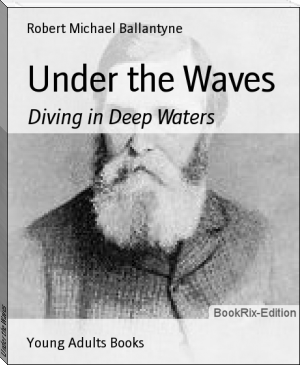Under the Waves - Robert Michael Ballantyne (red queen ebook .TXT) 📗

- Author: Robert Michael Ballantyne
Book online «Under the Waves - Robert Michael Ballantyne (red queen ebook .TXT) 📗». Author Robert Michael Ballantyne
Edgar Berrington immediately drew a revolver from his pocket, and stepping suddenly up to Dwarro, said sternly:--
"Look here!"
The pilot did look, and for the first time his calm, cool, imperturbable expression deserted him, for he saw that he had to deal with a resolute and powerful man. At the same time his right hand moved towards his breast, but it was arrested from behind in the iron grip of Joe Baldwin.
"Now, pilot," said Edgar, "submit, and no one shall harm you. Resist, and you are a dead man. Search him, Joe."
The diver opened Dwarro's pilot-coat, and found beneath it a brace of pistols and a long sheath knife, which he quietly removed and transferred to his own person. The other men in the boat looked on, meanwhile, in silence.
"Dwarro," continued Edgar, "_you_ have planned this, I know, but I'll thwart you. I won't tie or gag you. I'll make you sit at the helm and steer, while we evade your friends. I shall sit beside you, and you may rely on it that if you disobey an order in the slightest degree, or give a signal by word or look to any one, I'll blow out your brains. D'you understand me?"
The pilot made no reply save by a slight inclination of the head, while a dark frown settled on his features.
It was obvious that fear found no place in the man's breast, for a deep flush of indignation covered his countenance. He merely felt that he must obey or die, and wisely chose the former alternative.
Meanwhile the fleet of boats which had appeared to the Chinaman on the hill-top was now seen by the party in the boat as they drew nearer under the influence of a land breeze--their high sails rendering them visible before the low boat of our divers could be seen by them.
The wind had not yet reached the island, but, even if it had, the divers would not have hoisted sail, lest they should have been seen.
"Ship your oars now, lads, and pull for life," cried Edgar, seizing the tiller with one hand, while with the other he held the revolver. "You take _this_ oar, Dwarro, and pull with a will."
In a few seconds the pilot boat was creeping pretty swiftly along the rugged shore of the island, in the direction of the open sea. To lighten her, the little boat astern was cut adrift. Continuing their course, they rowed quite past the island, and then, turning abruptly to the southward, they pulled steadily on until the first "cat's-paw" of the breeze ruffled the glassy sea.
By this time the fleet of boats was distinctly visible, making straight for the island. Edgar now ordered the sails to be set, and bade Dwarro take the helm. The pilot obeyed with the air of a Stoic. It was clear that his mind was made up. This had the effect of calling up a look of settled resolution on Edgar's face.
In a few minutes the sails filled, and then, to the surprise not only of Dwarro but all on board, Edgar ordered the pilot to steer straight for the line of advancing boats.
Two of these had changed their course on first observing the divers' boat, but when they saw it steering straight down, as if to meet or join them, they resumed their course for the island. Presently the breeze increased, and the pilot boat leaped over the waves as if it had received new life.
"It's a bowld thing to try," muttered Rooney Machowl, "but I'm afeard, sir--"
He was silenced by a peremptory "Hush" from Edgar. "Get down so as to be out of sight," he continued, "all of you except the Chinamen.--You two come and sit by Dwarro."
As he spoke, Edgar himself sat down on an oar, so as to be able to see over the gunwale without himself being seen. To those in the fleet it would thus appear that their vessel was a pilot boat returning from seaward with its skipper and two Chinamen. Whatever Dwarro's intentions had been, he was evidently somewhat disconcerted, and glanced more than once uneasily at the calm youth who sat pistol in hand at his side directing him how to steer.
Although there was a considerable fleet of the piratical boats, they were spread out so that a space of several hundred yards intervened between each. Edgar steered for the centre of the widest gap, and his bold venture was favoured by a sudden increase of wind, which caused the waves to gurgle from the bow.
Just as they passed between two of the boats they were hailed by one of them. Edgar kept his eyes fixed on Dwarro, who became slightly pale. The click of the pistol at the moment caused the pilot to start.
"You may inform and we may be caught," said Edgar, sternly; "but whatever happens you shall die if you disobey. Speak not, but wave your hand in reply."
Dwarro obeyed. Those who had hailed him apparently thought the distance too great for speech; they waved their hands in return, and the boat passed on. A few minutes more and our divers were safely beyond the chance of capture, making for the mainland under a steady breeze.
------------------------------------------------------------------------
Note 1. The pump used by Denayrouze of Paris, besides being very simple in its parts and action, possesses an air-reservoir which renders a cessation of the pump-action for a few minutes of no importance.
CHAPTER FOURTEEN.
MISS PRITTY'S "WORST FEARS" ARE MORE THAN REALISED.
Turn we now to Miss Pritty--and a pretty sight she is when we turn to her! In her normal condition Miss Pritty is the pink of propriety and neatness. At the present moment she lies with her mouth open, and her eyes shut, hair dishevelled, garments disordered, slippers off, and stockings not properly on. Need we say that the sea is at the bottom of it? One of the most modest, gentle, unassuming, amiable of women has been brought to the condition of calmly and deliberately asserting that she "doesn't care!"--doesn't care for appearances; doesn't care for character; doesn't care for past reminiscences or future prospects; doesn't care, in short, for anything--life and death included. It is a sad state of mind and body--happily a transient!
"Stewardess."
"Yes, Miss?"
"I shall die."
"Oh no, Miss, don't say so. You'll be quite well in a short time," (the stewardess has a pleasant motherly way of encouraging the faint-hearted). "Don't give way to it, Miss. You've no idea what a happytite you'll 'ave in a few days. You'll be soon able to eat hoceans of soup and 'eaps of fat pork, and--"
She stops abruptly, for Miss Pritty has gone into sudden convulsions, in the midst of which she begs the stewardess, quite fiercely, to "Go away."
Let us draw a veil over the scene.
Miss Pritty has been brought to this pass by Mr Charles Hazlit, whose daughter, Aileen, has been taken ill in China. Being a man of unbounded wealth, and understanding that Miss Pritty is a sympathetic friend of his daughter and an admirable nurse, he has written home to that lady requesting her, in rather peremptory terms, to "come out to them." Miss Pritty, resenting the tone of the request as much as it was in her nature to resent anything, went off instanter, in a gush of tender love and sympathy, and took passage in the first ship that presented itself as being bound for the China seas. She did not know much about ships. Her maritime ideas were vague. If a washing-tub had been advertised just then as being A1 at Lloyds' and about to put forth for that region of the earth with every possible convenience on board for the delight of human beings, she would have taken a berth in it at once.
We do not intend to inflict Miss Pritty's voyage on our reader. Suffice it to say that she survived it, reached China in robust health, and found her sick friend,--who had recovered,--in a somewhat similar condition.
After an embrace such as women alone can bestow on each other, Miss Pritty, holding her friend's hand, sat down to talk. After an hour of interjectional, exclamatory, disconnected, irrelevant, and largely idiotical converse--sustained chiefly by herself--Miss Pritty said:--
"And oh! The pirates!"
She said this with an expression of such awful solemnity that Aileen could not forbear smiling as she asked--
"Did you see any?"
"Gracious! No," exclaimed Miss Pritty, with a look of horror, "but we _heard_ of them. Only think of that! If I have one horror on earth which transcends all other horrors in horribleness, that horror is-- pirates. I once had the misfortune to read of them when quite a girl-- they were called Buccaneers, I think, in the book--and I have never got over it. Well, one day when we were sailing past the straits of Malacca,--I think it was,--our captain said they were swarming in these regions, and that he had actually seen them--more than that, had slain them with his own--oh! It is too horrible to think of. And our captain was _such_ a dear good man too. Not fierce one bit, and _so_ kind to everybody on board, especially the ladies! I really _cannot_ understand it. There are such dreadfully strange mixtures of character in this world. _No_, he did not say he had slain them, but he used nautical expressions which amount to the same thing, I believe; he said he had spiflicated lots of 'em and sent no end of 'em to somebody's locker. It may be wrong in me even to quote such expressions, dear Aileen, but I cannot explain myself properly if I don't. It is fearful to know there are so many of them, `swarming,' as our captain said."
"The worst of it is that many of the boatmen and small traders on the coast," said Aileen, "are also pirates, or little better."
"Dreadful!" exclaimed her friend. "Why, oh _why_ do people go to sea at all?"
"To transport merchandise, I suppose," said Aileen. "We should be rather badly off without tea, and silk, and spices, and such things-- shouldn't we?"
"Tea and silk! Aileen. I would be content to wear cotton and drink coffee or cocoa--which latter I hate--if we only got rid of pirates."
"Even cotton, coffee, and cocoa are imported, I fear," suggested Aileen.
"Then I'd wear wool and drink water--anything for peace. Oh _how_ I wish," said Miss Pritty, with as much solemn enthusiasm as if she were the first who had wished it, "that I were the Queen of England--_then_ I'd let the world see something."
"What would you do, dear?" asked Aileen.
"Do! Well, I'll tell you. Being the head of the greatest nation of the earth--except, of course, the Americans, who assert their supremacy so constantly that they _must_ be right--being the head, I say, of the greatest earthly nation, with that exception, I would order out all my gun-ships and turret-boats, and build new ones, and send them all round to the eastern seas, attack the pirates in their strongholds, and--and-- blow them all out o'





Comments (0)